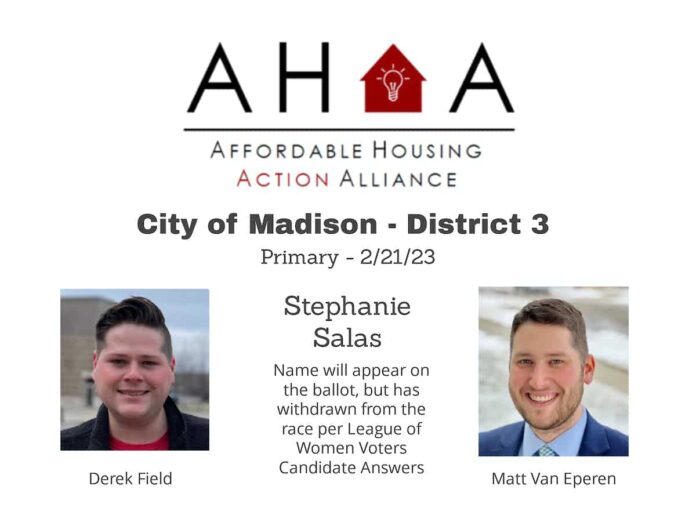While all the candidates say that affordable housing is a priority, read here to find out what they say they will do about it!
District 3 has a primary on Tuesday, February 21, 2022. Here’s a map of district 3, here’s where you find out where to vote. And here’s the candidates on affordable housing! All candidate answers can be found here.
- The City of Madison continues to put money into affordable housing, but we can’t develop affordable housing fast enough or in a large enough quantity for people with incomes that are at or below 30% of the Area Median Income (AMI). What new ideas would you bring to the table to assist us in getting more affordable housing for people at or below 30% AMI?
 Derek Field
Derek Field
I agree that the city adds too few housing options to meet the growing demand and need for housing, especially and in particular for low-income households and those below 30% of AMI. If elected Alder, I commit to working with advocacy groups like yours, nonprofits in the social services and housing space like Occupy Madison, and City and County staff working on getting people stable, long-term housing. One of my core values in office will be supporting and improving outcomes for working and low-income families. To make these projects successful, I will also advocate for more resources like community centers, libraries, and food pantries to be located near affordable housing to make sure residents have access to the support – which is currently a big challenge in my district on the Far East Side.
Stephanie Salas
Candidacy withdrawn; name will appear on the ballot.
Matt Van Eperen 
Honestly, I’m not so sure I’d be bringing new ideas to the table to assist us getting more affordable housing for people at or below 30% AMI. I think we all know what we need to do—we just need the courage to make the tough decisions. But, in the event no one has brought these ideas up, there’s a few tools in our toolbox we can at least examine: (i) zoning (which the council has considered at least in part), (ii) building ordinances (such as eliminating/reducing parking requirements or stairwells), (iii) approving developments more quickly / expedited permitting, (iv) expanding the affordable housing trust fund, (v) inventory/allocate public-owned land for affordable housing or shelter, (vi) density bonus, which would allow for developers to build more units in exchange for more affordable units, (vii) providing certain tax exemptions/abatement, (viii) fully legalizing accessory dwelling units, and (ix) reducing labor shortages/costs so that housing is built cheaper and costs aren’t passed on to owners/renters. With all of this, we also need to ensure sufficient inventory of all types of housing and housing of different size. We will also need to collaborate with surrounding municipalities to all work towards the same goal, since our neighbors are also experiencing rapid population growth and we cannot solve a housing crisis alone.
- Much of the affordable housing that is currently being built in our area is Section 42 tax credit housing in which the Area Median Income (AMI) is used to determine rent amounts. And because the AMI is so high in Dane County the rent for many of the units ends up being close to market rate. What can we do to make sure that the affordable housing we build ends up being affordable enough to reach lower incomes? Should Section 42 developments that receive city funding be required to have more units affordable for those at or below 30% of AMI than they do now?
 Derek Field
Derek Field
I think that Section 42-incentivised housing is an important tool to offer more below-market rate housing, but not the only one. I also support the City’s Public Housing program administered by the Community Development Authority, offering around 760 units of subsidized housing – but that number hasn’t grown fast enough with the rise in Madison’s population and the huge need for more affordable housing. In private development projects, I would absolutely like to see more affordable housing units and I support incentives for developers to add them, such as the recent proposal allowing more stories on downtown building projects where they add more affordable housing units. But we need affordable housing in every part of the city and I’ll support plans that further this goal.
Stephanie Salas
Candidacy withdrawn; name will appear on the ballot.
Matt Van Eperen
Ensuring that affordable housing reaches lower incomes is important because if housing near jobs and transit is expensive, low- and moderate-income people are forced to the outskirts of the metro area, requiring that they then spend more time and money on commuting. To make sure that the affordable housing we build ends up being affordable enough to reach lower incomes, we need to examine taking a multi-pronged approach. One, we need to engage in zoning reform, changing land use regulation to allow smaller, more compact housing. While single-family homes are necessary, so are other types of housing, like apartments, townhomes, duplexes, etc. Building height caps and minimum lot size may be necessary in some situations, but we need to ensure it’s not overused. Zoning reform should reduce or erase exclusionary zoning issues that some use to block new development. Another option to examine the impact of taxes on underused (or underutilized) land. If we can provide incentives that, for example, results in more development and more quickly on that land, it might allow Madison to capture some returns on the additional land value. This could be coupled with other changes like upzoning or allowing accessory dwelling units for those who want to keep the land but have the ability to create additional housing. Another tool is to expand housing subsidies to low-income households. Connecting folks to down payment assistance or other affordable housing funds. At least until there is sufficient inventory at more affordable prices, the city should absolutely consider requiring Section 42 developments that receive city funding have more units affordable for those at or below the 30% AMI as is now.
- We need more nonprofit developers who are willing to build affordable housing and keep it affordable for longer periods of time. What can we do to get more nonprofit developers in our community and support their growth and success?
 Derek Field
Derek Field
City partnerships and funding. I’ll work with housing experts who do housing work to understand what they need from the City and how the City can support their work to get people housed and to add affordable housing options.
Stephanie Salas
Candidacy withdrawn; name will appear on the ballot.
Matt Van Eperen 
I think the best thing we can do is seek out and build relationships with folks who have the capital and other means to build affordable housing, especially those folks who also have a desire to benefit their community. Besides encouraging them through non-financial means, the city can also examine additional financial incentives for nonprofits to build affordable housing and keep it affordable.
- Most affordable housing is only affordable for a period of 40 years or less, meaning our investment in affordable units is lost after a set time. Please discuss any ideas that you have for keeping affordable housing in Madison affordable long-term?
 Derek Field
Derek Field
I’m interested in learning more about why this trend is the case because I’m concerned about diminishing public benefit from public investments. If Madison’s affordable housing options become less affordable over time, the City needs to consider policy measures to keep those prices lower than market. I also support bringing more housing options to Madison overall, which should get closer to meeting the market demand for housing and take pressure off of house and rent prices – helping to stabilize all prices over time.
Stephanie Salas
Candidacy withdrawn; name will appear on the ballot.
Matt Van Eperen
 There’s a few ideas to keep affordable housing in Madison affordable long-term: (i) having a strong ‘opportunity to purchase’ legislation that requires owners to notify tenants of their intent to sell and provide tenants (or a third party) an opportunity to purchase the property; (ii) provide financing assistance for those seeking to purchase property and keep it affordable; (iii) provide financial assistance for rehabilitation of existing affordable housing to keep it affordable; (iv) use tools to force developers to keep the affordable rates for longer than the 15-30 years they’re required or able to through Sec 42 / LIHTC, making it permanent or significantly longer; (v) work with colleagues in Dane County government and state government to enact laws that promote long-term or permanent affordability; and (vi) encourage density. We also need to stay advised of what other municipalities are doing to solve these issues, so that we can use learned best practices.
There’s a few ideas to keep affordable housing in Madison affordable long-term: (i) having a strong ‘opportunity to purchase’ legislation that requires owners to notify tenants of their intent to sell and provide tenants (or a third party) an opportunity to purchase the property; (ii) provide financing assistance for those seeking to purchase property and keep it affordable; (iii) provide financial assistance for rehabilitation of existing affordable housing to keep it affordable; (iv) use tools to force developers to keep the affordable rates for longer than the 15-30 years they’re required or able to through Sec 42 / LIHTC, making it permanent or significantly longer; (v) work with colleagues in Dane County government and state government to enact laws that promote long-term or permanent affordability; and (vi) encourage density. We also need to stay advised of what other municipalities are doing to solve these issues, so that we can use learned best practices.
- Tenants in the city and county have had access over the last couple of years to eviction prevention and security deposit funds thanks to the federal government’s COVID relief funding. These funds – the CORE program – likely will end in 2023. Do you think the city should prioritize providing more funds once the COVID money ends and if so, please give some ideas of sources of funding?
 Derek Field
Derek Field
I know that facing eviction is a traumatic and scarring experience for tenants and families, particularly for kids who may lose their community of support at school after relocation, and that having an eviction record makes finding more housing far more challenging. I also know that evictions become more likely in a climate of rapidly rising housing costs paired with the rising cost of living generally – and low-income folks (and their kids) are always the worst-affected. For these reasons I do support the extension of eviction prevention programs by the City, though the budget challenges ahead with the loss of federal support will make this challenging. Dane County has housing support funding available and the City should continue to work and partner with the County to bring some of their revenue to eviction prevention in Madison. Also, the State of WI is sitting on a historic surplus and needs to return some of that money to municipal governments to support eviction. I will work to support these intergovernmental partnerships to bring more revenue to Madison to support eviction prevention.
Stephanie Salas
Candidacy withdrawn; name will appear on the ballot.
Matt Van Eperen 
I think it really depends on the need for more funds. I’m not opposed, per se, but I just don’t know enough of the volume and depth of need. If elected, I want to learn more from the community on their thoughts and needs. At the end of the day, individuals have a right to shelter, so the city’s moral and ethical duty is to guarantee that. Eviction prevention is just one tool.
- Are there any changes that the city could make – zoning requirements, paperwork, etc. – that could make affordable housing development and operation easier and more attractive to nonprofits and businesses, and also less burdensome for tenants who have to complete a lot of paperwork and meet reporting requirements?
 Derek Field
Derek Field
I support changes that are within the Alders’ authority to incentivise the addition of more affordable housing to Madison. Specifically, I’m interested in the recent proposal to allow more stories to be added to downtown developments up to height limits that add affordable housing. I think the community should consider similar zoning incentive ideas elsewhere along the Bus Rapid Transit corridor where tenants of these projects have access to high frequency transit as an affordable alternative to using and parking a car.
I don’t know much about the specific, day-to-day logistics involved with affordable housing development and operation but I’d like to engage with folks who do (stakeholders who do this work) to understand those barriers and then consider policy changes with the City to remove or reduce them. I fully believe that administrative burden should not be a barrier to low-income people getting support, so I will definitely want to better understand the burden that tennents face to complete paperwork and meet reporting requirements. If there are burdens that the City has the authority to remove, I’d like the City to consider removing them. For those that are not in the City’s authority, I’d like the City to measure the burden and its effects on tennents and report that information to the agency who created that burden.
Stephanie Salas
Candidacy withdrawn; name will appear on the ballot.
Matt Van Eperen 
Certainly by making some zoning changes, the hope (expectation, really) is that more housing will be built which will be affordable and make existing housing more affordable by adding to the (bare) inventory. We can also examine other ways to possibly reduce housing costs, such as reducing labor costs/shortages by investing in apprenticeship programs and trade schools, exploring policies that make it faster and easier to build homes like expedited permitting and reduction of red-tape (although we still need to be mindful of safety and environmental concerns), and examine manufactured homes/modular housing/pre-fabricated housing options. Also, I think a benefit of by-right development that is that there is more predictability and certainty about what kinds of development to expect. Not only would it likely lower the cost of development, it should also increase the supply of housing. When development becomes overburdened with discretion, those discretionary decisions can be weaponized against affordable housing development and against folks who are seeking affordable housing. Not all reforms being pushed will be adopted, but it’s important to again center our decisions on what is best for the broader community and work towards fair and affordable housing. As someone who has been fortunate enough to not need to complete a lot of paperwork and meet reporting requirements, if elected, I want to learn more about this and meet with folks in the community to figure out how to make their lives easier and ensure housing is affordable.
